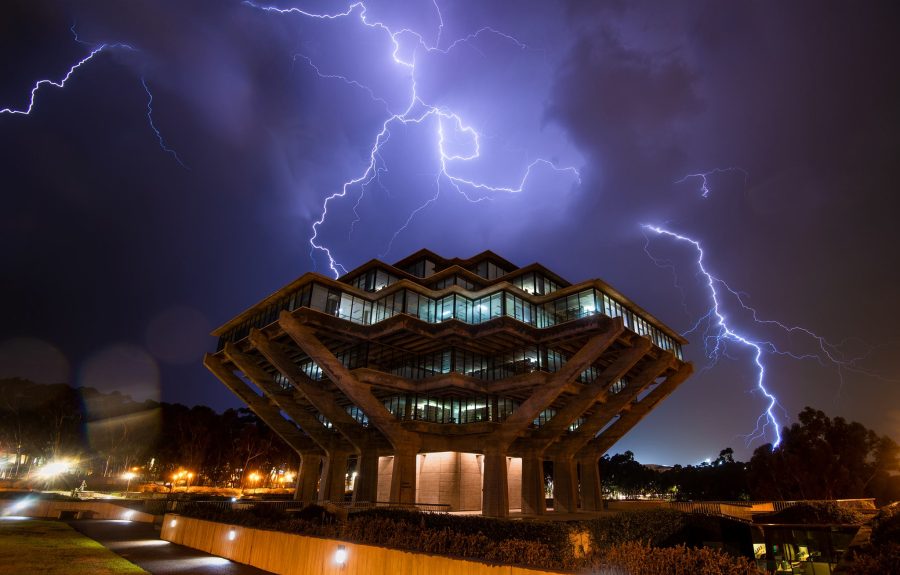Few will leave UC San Diego without taking advantage of its library resources at some point in their studies here, be it for a student’s report or a professor’s research. Geisel Library’s 7 million texts and innumerable digitized additions lay so easily within reach that it is easy to forget the librarians who spent hours cataloging all those entries. UCSD librarians are members of the American Federation of Teachers, another union in the middle of contract negotiations with the notoriously miserly UC system.
Librarians are an essential part of university staff whoenable the free exchange of and easy access to academic resources. They organize and catalog texts, preserve others by digitizing them, and teach students to discern reputable sources. Librarians as academic staff even engage in their own research. The UC system does not dispute their function, but in the bargaining sessions that have taken place since April, it has also rejected many of the changes that UC-AFT has put forward as vital to librarians and to their universities.
UC-AFT, among other issues, organizes around three major complaints: academic freedom, pay increases that do not keep up with the cost of living, and temporary librarian status. Though the UC system posits academic freedom as central to its mission but only extends this luxury toward faculty and students. The UC system does not classify librarians as faculty but as academic staff. So, even though librarians connect professors and students to necessary academic resources and conduct their own research, they are still under the thumb of university administrators.
If the UC system only wanted librarians to establish and update databases, a call for academic freedom by a librarian might seem like just a whim. However, the university encourages librarians to pursue “professional development” by way of research, publications, and presentations of their independent findings. In fact, professional development outside of their library duties factors into promotions. The UC system is trying the get the best of both worlds: It wants the reputation that comes from comprehensive libraries and frequent publications, but it also wants to stamp out unfavorable findings. Librarians’ classification as non-faculty academic staff is just a convenient ploy to control the content that comes out of its staff — a hypocritical goal for research institutions.
The publications and presentations that the UC system so carefully pores over when considering promotions also highlight the egregiously meager salaries paid to librarians. Library staff must pay the brunt of the costs for attending conferences and presenting findings. As with other workers on campus, they offer about 3-percent increases in salary each year. However, this increase already fails to keep up with the cost of living in major California cities, especially when librarians are expected to pay out-of-pocket for professional development.
Librarians in the UC system are not even paid the same as librarians in other school systems. In the California State University system, librarians are paid 25 percent more than librarians in the UC system. Adjusting for the cost of living, Yale University librarians make 30 percent more, University of Illinois in Urbana-Champaign librarians earn 64 percent more, and University of Michigan in Ann Arbor librarians earn 91 percent more. The positions also require that an applicant has a master’s degree, so the current terms offered by the UC system would leave many librarians underwater.
For many librarians, the work they do will last significantly longer than they will; UC-AFT also opposes the temporary status assigned to a growing number of librarians. Temporary status only exacerbates the existing problems facing librarians. Paying out-of-pocket to present at conferences for the sake of professional development is pointless if the librarian will not be around long enough for these efforts to push them up the pay scale. Temporary status also leaves librarians in a constant state of job insecurity, which puts their welfare into question and ensures that research will always take a backseat to the hunt for the next position.
Job insecurity is not a new concept within the UC system. Last May, AFSCME 3299 — the local chapter of the American Federation of State, County and Municipal Employees that contains many UC system employees — hosted a series of strikes. Among many complaints was the outsourcing of labor to cheaper, freelance workers who did not demand benefits. Even during the strikes against this blatant disregard for workers’ rights, the UC system enlisted temporary workers to fill the places of strikers. So, job insecurity is a tactic that the UC system readily uses when it is harder to negotiate with workers.
On Nov. 9, UC-AFT will enter its 11th bargaining session at UCSD, which will accompany a demonstration. It is imperative that students participate in this protest, but not just because students take advantage of the work librarians do on a regular basis. Students focus too much on the services available to them and not nearly enough on the people providing those services. Students want their residence halls cleaned without consideration for the conditions of the custodial staff. Students want to harass teaching assistants about a couple points without questioning why TA’s are not allowed to unionize. Students want the easiest access to academic resources without concern for the people who make those resources available. Even though students spend only a few years on this campus, detaching their experiences from the labor disputes that pop up during our time here only means that the workers we leave behind are worse off by the time we graduate. Librarians are an integral factor in the academic success of students and faculty. We all stand to suffer when they do.








